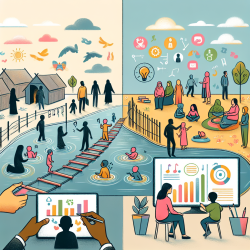Understanding the Intersection of Statelessness, Gender, and Health
The research article "Fault Lines of Refugee Exclusion" by Chakraborty and Bhabha highlights critical issues faced by refugees in South Asia, particularly during the COVID-19 pandemic. The paper focuses on the compounded vulnerabilities due to statelessness and gender, emphasizing how these factors exacerbate exclusion from essential services and rights. As practitioners, understanding these dynamics can enhance our ability to provide effective support and advocacy for refugee populations.
Key Takeaways for Practitioners
Practitioners working with refugee populations can benefit from the following insights derived from the research:
- Recognize the Impact of Statelessness: Statelessness severely limits access to healthcare, education, and legal protections. Practitioners should advocate for policies that address these barriers and work towards legal recognition and inclusion of stateless individuals.
- Address Gender-Specific Challenges: The intersection of gender and statelessness increases the risk of gender-based violence and exploitation. Practitioners should be equipped to identify these risks and provide gender-sensitive interventions and support systems.
- Enhance Data-Driven Interventions: Utilizing data to understand the specific needs and challenges of refugee populations can lead to more targeted and effective interventions. Practitioners should leverage data to inform their practices and advocate for data collection initiatives that highlight the needs of marginalized groups.
Encouraging Further Research and Advocacy
The findings from "Fault Lines of Refugee Exclusion" underscore the need for continued research and advocacy. Practitioners are encouraged to engage in research that further explores the intersections of statelessness, gender, and health. Additionally, advocacy efforts should focus on promoting legal reforms and policies that protect the rights of refugees and stateless individuals.
Practical Applications in Online Therapy
For companies like TinyEYE, which provide online therapy services to schools, understanding these dynamics is crucial. Online therapy platforms can be tailored to address the unique needs of refugee children by:
- Providing Culturally Sensitive Content: Develop therapy content that is culturally relevant and accessible to refugee children, considering language barriers and cultural contexts.
- Facilitating Access to Services: Work with schools and communities to ensure that refugee children have access to the necessary technology and support to participate in online therapy sessions.
- Collaborating with Stakeholders: Engage with local and international organizations to support advocacy efforts and share data-driven insights that can inform policy and practice.
Conclusion
The research presented in "Fault Lines of Refugee Exclusion" provides valuable insights for practitioners working with refugee populations. By understanding the complex interplay of statelessness, gender, and health, practitioners can improve their skills and contribute to better outcomes for refugee children. To read the original research paper, please follow this link: Fault Lines of Refugee Exclusion.










